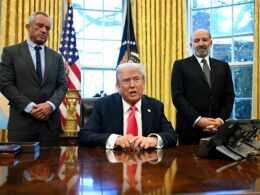Nigeria Advances Trade Integration with ECOWAS Tariff Schedule under AfCFTA
Nigeria has officially published and submitted its ECOWAS Schedule of Tariff Offers for Trade in Goods to the AfCFTA Secretariat, marking a significant step in the country’s trade integration initiatives. This announcement precedes the 16th Council of Ministers Meeting on Trade, set to take place on April 15 in Kinshasa, Democratic Republic of Congo, and highlights Nigeria’s commitment to enhancing its participation in the African Continental Free Trade Area (AfCFTA).
The newly gazetted Schedule lays the groundwork for the implementation of zero tariffs on 90% of tariff lines under the AfCFTA framework, providing Nigerian products with enhanced access and competitiveness in various African markets. This initiative is not only in line with Nigeria’s regional trade obligations but also reinforces the nation’s critical role in shaping a unified continental market.
The endorsement from President Bola Ahmed Tinubu, who signed off on the transmission of the ECOWAS Tariff Schedule, signals Nigeria’s readiness to engage in trade utilizing AfCFTA’s preferential tariff regime. This step illustrates the country’s ambition to promote export-led economic growth, improve its trade balance, and attract investments within the continent.
“By gazetting and transmitting the ECOWAS Schedule of Tariffs to the AfCFTA Secretariat, Nigeria is clearly indicating its commitment to trading under the Agreement,” stated Dr. Jumoke Oduwole, Minister of Industry, Trade, and Investment. “This landmark achievement allows Nigerian exporters to take advantage of preferential tariffs across African markets, positioning Nigeria as a pivotal player in regional and global commerce.”
In July 2024, Nigeria first exported goods under the AfCFTA framework. Following this formal gazetting, the country is poised to intensify its involvement in the agreement, fostering significant opportunities for businesses, manufacturers, and exporters.
Economic Implications
The gazetting of the Tariff Schedule is anticipated to yield substantial economic benefits, including:
- Trade Expansion: By eliminating tariffs on the majority of goods, Nigerian products will gain competitive access to various African markets.
- SME Growth: Lower trade barriers will create new opportunities for small and medium enterprises, allowing them to scale regionally.
- Job Creation and Investment: An increase in exports and heightened investor confidence are expected to facilitate job creation and attract both intra-African and foreign direct investment.
- Regional Integration: Enhanced trade relationships within the ECOWAS and the broader AfCFTA region will further augment Nigeria’s ability to influence African economic policies.
Tariff Reduction Strategy
Nigeria’s approach to tariff reductions for trade in goods follows a structured, phased plan over a decade beginning in 2021:
- By 2025, the fifth year of AfCFTA implementation, the country will implement a 50% tariff reduction on goods traded with the least developed countries in Africa, enacted at a rate of 10% annually.
- For trade with developing countries, Nigeria is allowed to eliminate tariffs altogether (0%) under AfCFTA, with a flexible approach allowing for a 20% reduction each year.
This tariff strategy aligns with directives from the African Union’s 35th Ordinary Session of Heads of State and Government, held in February 2022, which supports the acceptance of Nigerian consignments under the AfCFTA Agreement.
Furthermore, Nigeria is solidifying its leadership in digital trade. In February, President Tinubu received recognition for his contributions to advancing AfCFTA’s digital trade framework. As a co-Champion of Digital Trade, Nigeria is working towards streamlining cross-border e-commerce and digital payment systems, thus making AfCFTA more accessible to tech-driven enterprises and SMEs.








![OPM Pastor Accuses Lagos Government Of Injustice Over Demolition Of Free School [VIDEO] OPM Pastor Accuses Lagos Government of Injustice Over Demolition Of Free School](https://reportafrique.com/wp-content/uploads/2025/01/tori4town9ja-20250112-0002-260x195.jpg)

Join our Channel...